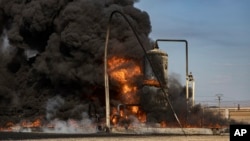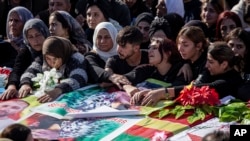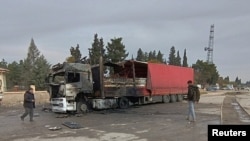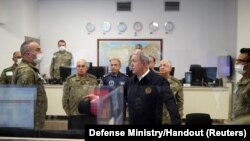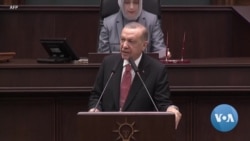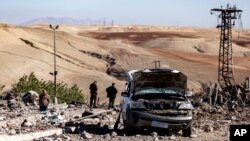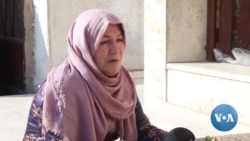Turkish President Recep Tayyip Erdogan said Wednesday the military will begin a land operation against Kurdish militants in northern Syria “at the most convenient time.”
Cheered by party lawmakers as he arrived at parliament, Erdogan reiterated pledges made earlier this week to escalate operations against Kurdish groups in Syria.
“While we press ahead with air raids uninterrupted, we will crack down on terrorists also by land at the most convenient time for us,” Erdogan said.
“Turkey has the power to identify, catch and punish terrorists who are involved in attacks against our country and nation, and those helping them, inside and outside our borders,” the president added.
Kurdish PKK separatists have been fighting a decades-long insurgency against Ankara. Kurdish militant groups control some areas of northern Syria close to the Turkish border.
Istanbul bombing
Turkey blames the Kurdish militants for a November 13 bomb attack in Istanbul that killed eight people and injured more than 80 others. The Kurds deny responsibility.
In response, Turkey carried out air raids on Kurdish positions in Syria and northern Iraq this week, saying the operations killed 184 militants.
Kurdish groups say only civilians were killed in the air raids.
“The violations which have been committed by the Turkish occupation and the daily targeting are part of the genocidal war which was declared by the occupying Turkish regime against nations in northeast Syria in order to occupy these areas and destabilize security and stability,” said Talaat Younes, the co-chair of the Executive Council of the Autonomous Administration in Syria’s Jazeera region.
Border attacks
Rockets were fired across the border from Syria into Turkey Tuesday, killing at least three people. While Kurdish-led forces in Syria have not claimed responsibility, the Kurdish-allied Syrian Democratic Forces on Monday vowed to respond to the Turkish airstrikes “effectively and efficiently at the right time and place.”
The escalation threatens to ignite a febrile region, contested by global and regional powers and their allied militias amid the fallout of the Syrian civil war.
Turkish offensive
Turkish forces entered northern Syria in August 2016 in "Operation Euphrates Shield,” targeting the Islamic State or IS terror group and, more recently, Kurdish militants. Turkey and its allied Syrian militias now control large areas along the border.
Meanwhile, Russia continues to support rival Syrian government forces. Turkey and Russia struck an agreement in 2019 to push back Kurdish fighters from a “safe zone” along the Turkey-Syria border.
Ankara now sees an opportunity to expand its control and influence, says analyst Ali Bilgic of Britain’s Loughborough University.
“Russian influence in Syria, because of the war in Ukraine, has significantly declined recently. And Turkey, in my opinion, has been searching for an opportunity to change the status quo in Syria in favor of Turkish political interests, particularly in relation to the Kurdish region.”
The Turkish president may also see domestic political benefits, Bilgic told VOA.
“Turkey will be able to send more Syrian refugees back to Syria. And it will be an important political success for the government in consideration of the forthcoming elections in June 2023.”
US dilemma
Turkey’s pledge to launch a renewed offensive poses a challenge for its NATO ally, the United States. Washington supported Kurdish YPG forces in Syria in the fight against Islamic State and does not view the group as terrorists, despite designating the PKK as such.
The U.S. still has around 900 troops in the region and there are fears they could be caught up in any fighting. The Pentagon confirmed Wednesday that a Turkish airstrike targeted a military base sometimes used by U.S. forces.
In a statement to VOA Tuesday, Pentagon spokesperson Lt. Col. Phillip Ventura said, “Over the weekend, we saw a wave of Turkish airstrikes in northern Syria and Iraq, and new reports of attacks by Syrian Kurdish forces into southern Turkey. The Department of Defense continues to oppose any military action that destabilizes the situation in Syria or violates Iraq’s sovereignty through military actions uncoordinated with the Iraqi government. These actions threaten our shared goals, including to continue the fight against ISIS and make sure the group can never resurge.”
Russia expresses concerns
Russia has also called for de-escalation.
“We understand and respect Turkey’s concerns in regards to providing for its own security, we believe it is Turkey’s legitimate right. At the same time, we call for all the parties to avoid steps which could lead the situation to deteriorate. It might come back as a boomerang and worsen the security situation,” Kremlin spokesman Dmitry Peskov told Reuters Tuesday.
Turkey sees itself in a strong geopolitical position, argues analyst Ali Bilgic of Loughborough University.
“It can talk to Russia. And for Russia, Turkey is one of the one of the countries through which it can break the international and diplomatic isolation. And the United States needs Turkey because, pretty much, Turkish forces are the only NATO forces in Syria against Russia-supported (Syrian President) Assad's regime,” Bilgic told VOA.
Iran launches attacks
Adding to the growing regional tensions, Iran has launched drone and missile attacks on Iranian-Kurdish groups in northern Iraq, accusing them of destabilizing Kurdish-majority provinces in western Iran amid ongoing anti-government protests.
The United Nations has urged all parties to exercise maximum restraint and abide by international law.




